Hunting Zero Read online
Page 4
“You know about… them?”
The man nodded. “Already on the news. Their photos, a hotline to call with tips or sightings.”
Reid bit his lip. He hadn’t thought about that, the publicity—and the invariable connection to him. He immediately thought of their Aunt Linda, who lived up in New York. These sorts of things had a way of spreading quickly, and if she heard about it she would be fraught with concern, calling and calling Reid’s phone for information and getting none.
“Got something,” Watson said suddenly. “Thompson’s truck was found at a rest stop seventy miles south of here on I-95. A woman was found dead at the scene. Her throat was cut, car gone, ID taken.”
“So we don’t know who she was?” Reid asked.
“Not yet. But we’re on it. I’ve got a tech on the inside scanning police airwaves and keeping an eye via satellite. As soon as something’s reported, you’ll know about it.”
Reid grunted. Without an ID they wouldn’t be able to find the vehicle. Even though it wasn’t much of a lead, it was still something to go on, and he was anxious to be on the trail. He had the door to the Trans Am open as he asked, “What exit?”
Watson shook his head. “Don’t go down there, Kent. It’ll be crawling with cops, and I’m sure Agent Strickland is en route.”
“I’ll be careful.” He didn’t trust that the police or this rookie agent would find everything that he would. Besides, if Rais was playing this the way Reid thought he would, there could be another clue in the form of a taunt, something meant just for him.
The photo of his girls flashed again across his memory, the one Rais had sent from Maya’s phone, and it reminded him of one last thing. “Here, hang onto this for me.” He handed Watson his personal cell. “Rais has Sara’s number, and I’ve got her phone forwarding to mine. If anything comes through, I want to know about it.”
“Sure. The crime scene is on exit sixty-three. You need anything else?”
“Don’t forget to have Maria call me.” He settled behind the wheel of the sports car and nodded to Watson. “Thank you. For all your help.”
“Not doing it for you,” Watson reminded him somberly. “Doing it for those kids. And Zero? If I’m made, if I’m compromised in any way, if they figure out what I’m doing with you, I’m out. You understand? I can’t afford to get agency blacklisted.”
Reid’s initial kneejerk instinct was a quick swell of anger—this is about my children, and he’s afraid of being blacklisted?—but he stifled it just as fast as it came on. Watson was an unexpected ally in all of this, and the man was sticking his neck out for his girls. Not for him, but for two children he’d only met briefly.
Reid nodded tightly. “I understand.” To the solemn, grunting mechanic he added, “Thanks, Mitch. I appreciate your help.”
Mitch grunted in response and pressed the switch to open the garage bay as Reid climbed into the Trans Am. The interior was all black leather, clean, pleasant smelling. The engine turned over immediately and thrummed under the hood. A 1987 model, his brain told him. 5.0 liter V8 engine. At least two hundred fifty horsepower.
He pulled out of the Third Street Garage and headed for the highway, his hands tightly wrapped around the steering wheel. The horrors that had been swirling through his head previously were replaced with a steely resolve, a hard determination. There was a hotline. The police were on it. The CIA was on it. And now he too was on the road after them.
I’m on my way. Dad is coming for you.
And for him.
CHAPTER FIVE
“You should eat.” The assassin gestured at a carton of Chinese takeout on the nightstand beside the bed.
Maya shook her head. The food was long cold by now, and she wasn’t hungry. Instead, she sat on the bed with her knees drawn up, Sara leaning against her with her head in her older sister’s lap. The girls were handcuffed together, Maya’s left wrist with Sara’s right. Where he had gotten the handcuffs, she didn’t know, but the assassin had warned them several times that if either of them tried anything to escape or make noise, the other would suffer for it.
Rais sat in an armchair near the door of the seedy motel room with orange carpeting and yellow walls. The room smelled musty and the bathroom reeked of bleach. They had been there for hours; the ancient bedside alarm clock told her in blocky red LED numerals that it was two thirty in the morning. The television was on, tuned into a news station with the volume low.
A white station wagon was parked directly outside, mere feet from the door; the assassin had stolen it after dark from a used car lot. It was the third time they had switched cars that day, from Thompson’s truck to the blue sedan and now to the white SUV. Each time they did, Rais changed directions, heading first south, then back north, and then to the northeast toward the coast.
Maya understood what he was doing; a cat-and-mouse game, leaving the stolen vehicles in different locations so that the authorities would have no idea which way they were heading. Their motel room was less than ten miles from Bayonne, not far from the border to New Jersey and New York. The motel itself was a strip of a building that was so rundown and frankly disgusting that driving by it gave the impression it had been closed for years.
Neither of the girls had slept much. Sara had catnapped in Maya’s arms, stealing twenty or thirty minutes at a time before rousing with a start and a whimper as she woke from whatever dream she’d been having and remembered where she was.
Maya had fought the exhaustion, trying to stay awake as long as possible—Rais had to sleep sometime, she knew, and it could afford them a precious few minutes they needed to make a run for it. But the motel was located in an industrial park. She saw when they had pulled in that there were no houses nearby and no other businesses that would be open this time of night. She wasn’t even certain anyone would be in the motel office. They would have nowhere to go except into the night, and the handcuffs would slow them down.
Eventually Maya had succumbed to the fatigue and unwillingly nodded off. She was asleep less than an hour when she woke with a slight gasp—and then gasped again when, startled, she saw Rais sitting in the armchair only three feet from her.
He was staring directly at her, eyes wide open. Just watching.
It had made her skin crawl… until a whole minute passed, and then another. She watched him, staring back, her fright mingling with curiosity. Then she realized.
He sleeps with his eyes open.
She wasn’t sure if that was more disturbing than waking to find him watching her or not.
Then he blinked, and she sucked in yet another startled gasp, her heart leaping into her throat.
“Damaged facial nerves,” he said quietly, almost a whisper. “I’ve heard it can be quite unsettling.” He gestured to the carton of leftover Chinese takeout that had been delivered to their room hours earlier. “You should eat.”
She shook her head, cradling Sara across her lap.
The low-volume news station was repeating the major headlines from earlier that day. A terror organization had been deemed responsible for the release of a deadly smallpox virus in Spain and other parts of Europe; their leader, as well as the virus, had been apprehended and several other members were now in custody. That afternoon the United States had officially lifted its international travel ban to all countries except for Portugal, Spain, and France, where there were still isolated incidents of mutated smallpox. But everyone seemed confident that the World Health Organization had the situation under control.
Maya had suspected that her father had been sent to assist with that case. She wondered if he had been the one to take down the ringleader. She wondered if he was back in the country yet.
She wondered if he had found Mr. Thompson’s body. If he had realized they were missing—or if anyone had realized they were missing.
Rais sat in the yellow chair with a cell phone resting on the armrest. It was an older style phone, practically prehistoric by today’s standards—it wasn’t good for anything bu
t calls and messages. A burner phone, Maya had heard such things called on TV. It did not connect to the internet and had no GPS, which she knew from police procedural shows meant it could only be traced by the phone number, which someone would have to have.
Rais was waiting for something, it seemed. A call or a message. Maya desperately wanted to know where they were going, if there even was a destination. She suspected that Rais wanted their father to find them, to track them down, but the assassin did not seem to be in any rush to get anywhere. Was this his game, she wondered, stealing cars and changing directions, eluding the authorities, in the hopes that their father would be the one to find them first? Would they just keep bouncing from place to place until there was a faceoff?
Suddenly a monophonic ring tone blared out from the burner phone beside Rais. Sara jumped slightly in her arms with the high-pitched intrusion.
“Hello.” Rais answered the phone flatly. “Ano.” He stood from his chair for the first time in three hours as he switched from English to some foreign tongue. Maya knew only English and French, and she could recognize a handful of other languages from single words and accents, but she didn’t know this one. It was a guttural tongue, but not altogether unpleasant.
Russian? she thought. No. Polish, maybe. It was no use guessing; she couldn’t be sure, and knowing wouldn’t help her understand anything that was being said.
Still, she listened in, noting the frequent usage of “z” and “-ski” sounds, trying to pick out cognates, of which there seemed to be none.
There was one word that she managed to pick out, however, and it made her blood run cold.
“Dubrovnik,” the assassin said, as if by way of confirmation.
Dubrovnik? Geography was one of her best subjects; Dubrovnik was a city in southwestern Croatia, a famous seaport and popular tourist destination. But far more important than that was the implication of the mentioned word.
It meant that Rais was planning to take them out of the country.
“Ano,” he said (which seemed like an affirmative; she guessed it to mean “yes”). And then: “Port Jersey.”
They were the only two English words in the entire conversation besides “hello,” and she picked them out easily. Their motel was already close to Bayonne, a stone’s throw from the industrial Port Jersey. She had seen it many times before, crossing the bridge from Jersey into New York or back, stacks upon stacks of multicolored freight containers being loaded by cranes onto vast, dark ships that would carry them overseas.
Her heartbeat tripled its pace. Rais was going to take them out of the US by way of Port Jersey to Croatia. And from there… she had no idea, and no one else would either. There would be little hope of ever being found again.
Maya could not allow it. Her resolve to fight back strengthened; her determination to do something about this situation came roaring back to life.
The trauma of watching Rais cut the woman’s throat in the rest stop bathroom earlier that day still lingered; she saw it whenever she closed her eyes. The vacant, dead stare. The pool of blood nearly touching her feet. But then she touched her sister’s hair and she knew that she would absolutely accept the same fate if it meant Sara would be safe and away from this man.
Rais continued his conversation in the foreign language, chattering in short, punctuated sentences. He turned and parted the thick curtains slightly, only an inch or so, to peer out at the parking lot.
His back was to her, probably for the first time since they had arrived at the seedy motel.
Maya reached out and very carefully pulled open the drawer of the nightstand. It was all she could reach, handcuffed to her sister and without moving from the bed. Her gaze flitted nervously to Rais’s back, and then to the drawer.
There was a Bible in it, a very old one with a chipped, peeling spine. And beside it was a simple blue ballpoint pen.
She took it and closed the drawer again. At almost the same moment Rais turned back. Maya froze, the pen clutched in her closed fist.
But he did not pay her any attention. He seemed bored with the call now, anxious to get off the phone. Something on the television caught his attention for a few seconds and Maya hid the pen in the elastic waistband of her flannel pajama pants.
The assassin grunted a halfhearted goodbye and ended the call, flinging the phone onto the armchair cushion. He turned toward them, scrutinizing each in turn. Maya stared straight ahead, her gaze as vacant as she could make it, pretending to watch the newscast. Seemingly satisfied, he took his post on the chair again.
Maya gently stroked Sara’s back with her free hand as her younger sister stared at the television, or perhaps at nothing at all, her eyes half-closed. After the incident in the restroom at the rest stop, it took hours for Sara to stop crying, but now she simply lay there, her gaze empty and glazed. It seemed she had nothing left.
Maya ran her fingers up and down her sister’s spine in an attempt to comfort her. There was no way for them to communicate between each other; Rais had made it clear that they were not allowed to speak unless asked a question. There was no way for Maya to relay a message, to create a plan.
Though… maybe it doesn’t have to be verbal, she thought.
Maya stopped touching her sister’s back for a moment. When she resumed, she took her index finger and surreptitiously drew the slow, lazy shape of a letter between Sara’s shoulder blades—a large S.
Sara lifted her head curiously for just a moment, but she did not look up at Maya or say anything. Maya hoped desperately that she understood.
Q, she drew next.
Then U.
Rais sat in the chair in Maya’s peripheral vision. She didn’t dare glance over at him for fear of seeming suspicious. Instead she stared straight ahead, as she had been, and drew the letters.
E. E. Z. E.
She moved her finger slowly, deliberately, pausing for two seconds between each letter and five seconds between each word until she spelled out her message.
Squeeze my hand if you understand.
Maya did not even see Sara move. But their hands were close, on account of being cuffed together, and she felt cool, clammy fingers close tightly around her own for a moment.
She understood. Sara got the message.
Maya started anew, moving slowly as possible. There was no rush, and she needed to make sure that Sara got every word.
If you have a chance, she wrote, you run.
Do not look back.
Do not wait for me.
Find help. Get Dad.
Sara lay there, quietly and perfectly still, for the entire message. It was a quarter after three before Maya finished. Finally she felt the cool touch of a thin finger on the palm of her left hand, nestled partially under Sara’s cheek. The finger traced a pattern on her palm, the letter N.
Not without you, Sara’s message said.
Maya closed her eyes and sighed.
You have to, she wrote back. Or there is no chance for either of us.
She didn’t give Sara an opportunity to respond. Once she had finished her message, she cleared her throat and said quietly, “I have to go to the bathroom.”
Rais raised an eyebrow and gestured toward the open bathroom door on the far end of the room. “By all means.”
“But…” Maya lifted her shackled wrist.
“So?” the assassin asked. “Take her with you. You have a free hand.”
Maya bit her lip. She knew what he was doing; the sole window in the bathroom was small, barely large enough for Maya to fit through and wholly impossible while handcuffed to her sister.
She slid off the bed slowly, prodding her sister to come with her. Sara moved mechanically, as if she had forgotten how to properly use her limbs.
“You have one minute. Do not lock the door,” Rais warned. “If you do I will kick it down.”
Maya led the way and closed the door to the tiny bathroom, cramped with both of them standing in it. She flicked on the light—fairly certain she saw a roach s
kitter to safety beneath the sink—and then turned on the bath fan, which droned loudly overhead.
“I won’t,” Sara whispered almost immediately. “I won’t go without—”
Maya quickly held a finger to her own lips to signal for quiet. For all she knew, Rais was standing right on the other side of the door with an ear to it. He did not take chances.
She quickly pulled the ballpoint pen from the hem of her pants. She needed something to write on, and the only thing available was toilet paper. Maya tore off a few squares and spread them on the small sink, but every time she pressed the pen to it, the paper tore easily. She tried again with a few fresh squares, but again the paper ripped.
This is no use, she thought bitterly. The shower curtain would do her no good; it was just a plastic sheet hanging over the tub. There were no curtains over the small window.
But there was something she could use.
“Stay still,” she whispered in her sister’s ear. Sara’s pajama pants were white with a pineapple print on them—and they had pockets. Maya turned one of the pockets inside out and, as carefully as she could, tore it out until she had a rough-edged triangular scrap of fabric that had the fruity imprint on one side but was all-white on the other.
She quickly flattened it on the sink and wrote carefully as her sister watched. The pen snagged several times on the fabric, but Maya bit her tongue to avoid grunting in angry frustration as she wrote out a note.
Port Jersey.
Dubrovnik.
There was more that she wanted to write, but she was nearly out of time. Maya stowed the pen under the sink and tightly rolled the fabric note into a cylinder. Then she looked around desperately for a place to hide the note. She couldn’t just stick it under the sink with the pen; that would be too conspicuous, and Rais was thorough. The shower was out of the question. Getting the note wet would run the ink.
An abrupt knock on the thin bathroom door startled them both.
“It’s been a minute,” Rais said clearly from the other side.

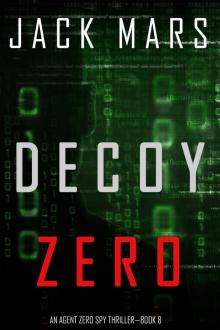 Decoy Zero
Decoy Zero Target Zero
Target Zero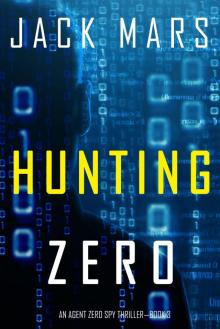 Hunting Zero
Hunting Zero Recall Zero
Recall Zero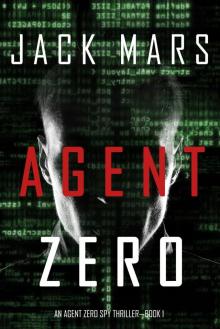 Agent Zero
Agent Zero Primary Valor
Primary Valor File Zero
File Zero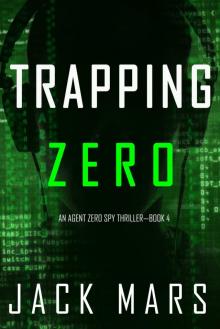 Trapping Zero
Trapping Zero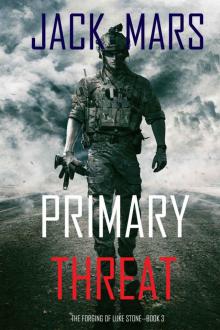 Primary Threat
Primary Threat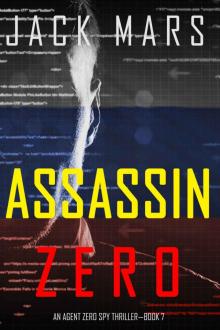 Assassin Zero
Assassin Zero Zero Zero
Zero Zero Zero Zero (An Agent Zero Spy Thriller—Book #11)
Zero Zero (An Agent Zero Spy Thriller—Book #11)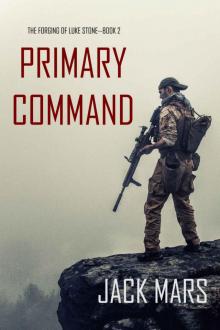 Primary Command
Primary Command![[Luke Stone 02.0] Oath of Office Read online](http://i1.bookreadfree.com/i/03/21/luke_stone_02_0_oath_of_office_preview.jpg) [Luke Stone 02.0] Oath of Office
[Luke Stone 02.0] Oath of Office House Divided
House Divided Oath of Office (a Luke Stone Thriller—Book #2)
Oath of Office (a Luke Stone Thriller—Book #2) Our Sacred Honor (A Luke Stone Thriller—Book 6)
Our Sacred Honor (A Luke Stone Thriller—Book 6) Luke Stone 04 - Oppose Any Foe
Luke Stone 04 - Oppose Any Foe Our Sacred Honor
Our Sacred Honor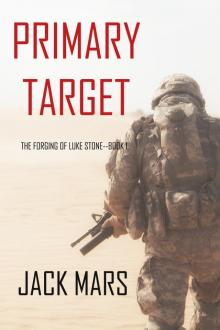 Primary Target
Primary Target Luke Stone 03 - Situation Room
Luke Stone 03 - Situation Room Any Means Necessary: A Luke Stone Thriller (Book 1)
Any Means Necessary: A Luke Stone Thriller (Book 1) Oath of Office
Oath of Office